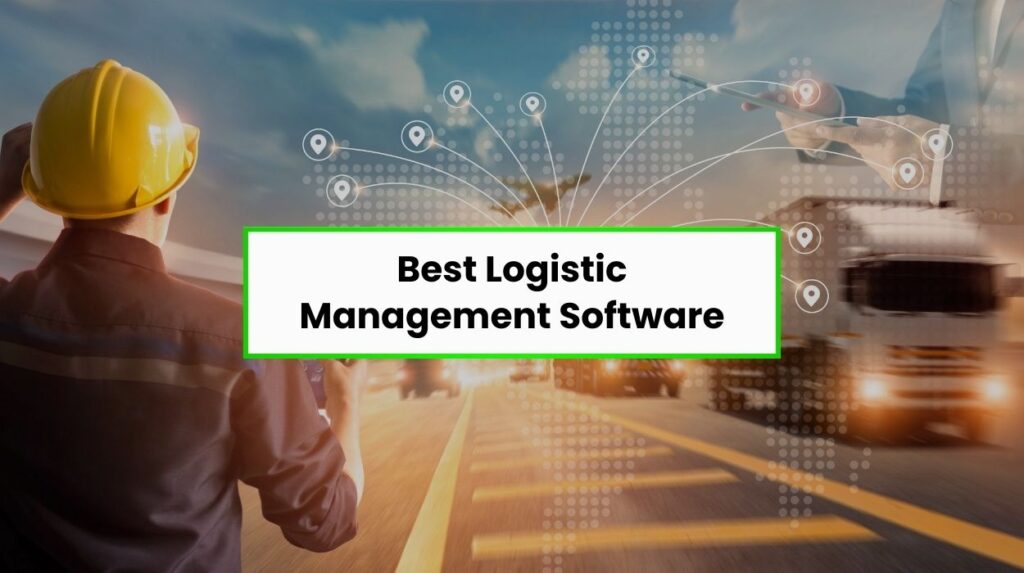As the world keeps getting more competitive with each passing day, firms across the globe have no option but to move in tandem with the evolving needs and wants of their consumers. Among others, logistics management is one of the top things that people consider to be very crucial for the success of the business.
This has been checked by the coming of logistic management software into play. From the given article, one can find out what the concept of logistic management software is, how one should go about choosing the best variant that suits him or her, and get to know ten variants that are already available in the market.
Whether you are a mere beginning businessman or an officer of a large corporation, by following this guide, you most surely shall be in a position to make a rational decision on which logistic management software would be suitable to adopt for your business.
What is the Best Logistic Management Software?
Logistical management software is a special type of computer program and it is helpful for a business to plan and organize supply chains. Essentially, they are a form of digital assistant, which maintains records of all that is involved in the process of product or goods’ transportation from one place to another.
It could also involve different degrees of shipment planning, inventory control, monitoring of delivery, and even storage that could be facilitated by the use of a logistical management system. A good logistic management software will make such complicated processes a lot easier to handle. It unites all the various aspects of logistics in one place where you can look at what occurs at each phase of the process.
Thus, you will make more strategic decisions, you will be in a position to save your time, and you will be able to minimize those mistakes that drain out the resources of your company. Good logistics management software also assists you in dealing with your partners starting from suppliers up to the shipping companies.
It will tell you in real-time about your products, direct them in the most optimal delivery path, and even at what stage you will run out of stock.
Tips for Choosing the Best Logistic Management Software
There are times when choosing the right logistic management software for your company becomes frustrating, as there are quite a few options to choose from, and all promise to be the best. Here are some tips that will help in choosing rightly:
1. Know Your Requirements: First, before you look at the various options available, spend some time being clear about what is required for your business.
2. Consider the Size of Your Business: While some software is ideal for small businesses, other software is meant to be utilized by enterprise organizations. Find a solution that best suits the size of your company and one that will scale up as your business grows.
3. Visualize the Integration Possibilities: The chosen software should integrate well with other tools or systems that may be put to use. It might be accounting software, e-commerce, or CRM systems.
4. Ease of use: Of course, the best program is one which your team can learn and practice sans too much ado. Look out for software with an easily comprehensible interface, backed by a good customer support service.
5. Reporting Functionality: Good logistic management software should give extensive reports and analytics on the most important business aspects. This could result in deeper insight into your operations and, therefore, informed decisions based on real data.
6. Consider Mobile Access: Anything that can be accessed today from anywhere at any time has an added advantage. Look for options offering mobile apps or web-based interfaces.
7. Scalability: Your growth may change your software needs. You need to choose a solution that can grow with you to meet future demands without necessarily overhauling it.
8. Customer Reviews: Do not take the word of the companies alone. Also, seek reviews from businesses similar to yours to have a sense of the software in practical application.
9. Cost: While price shouldn’t be the sole determining factor, it is just as important to select the appropriate software that would fall within your budget. Consider both upfront and ongoing fees when making your decision.
10. Try Before You Buy: Most software vendors allow for free trials or demos. Take this as an opportunity to get a feel of how the software works before investing in it.
List of Top 10 Best Logistic Management Software
Now that we understand what logistic management software is and how to choose the best one, let’s look at the top 10 options available in the market. Each of these software solutions has its strengths, so consider which features are most important for your business needs.
1. SAP Transportation Management
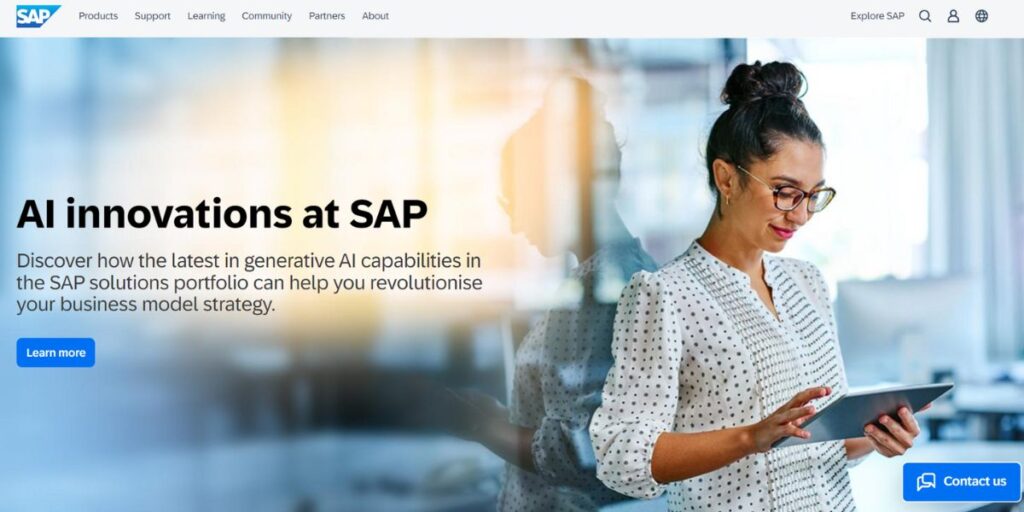
SAP TM is that module in SAP supply chain management that optimizes and manages the transportation processes in businesses. It automates the planning, execution, and monitoring activities of transportation in all modes-road, rail, sea, and air.
SAP TM is integrated with other SAP modules, such as SAP ERP and SAP EWM, thereby enabling them to coordinate orders, freight, and logistics efficiently. This includes route optimization, carrier selection, freight cost management, and real-time tracking.
SAP TM enhances efficiency in transportation, reduces costs, and gives a higher service level since the tools are comprehensive to manage complex transportation networks.
Key Features:
– Comprehensive transportation planning and execution
– Real-time visibility across the supply chain
– Advanced analytics for better decision-making
– Integration with other SAP modules
– Supports multiple modes of transportation
Price:
SAP uses a custom pricing model based on the size of your business and your specific needs. You’ll need to contact them directly for a quote, but expect it to be on the higher end, suitable for medium to large enterprises.
2. Oracle Transportation Management
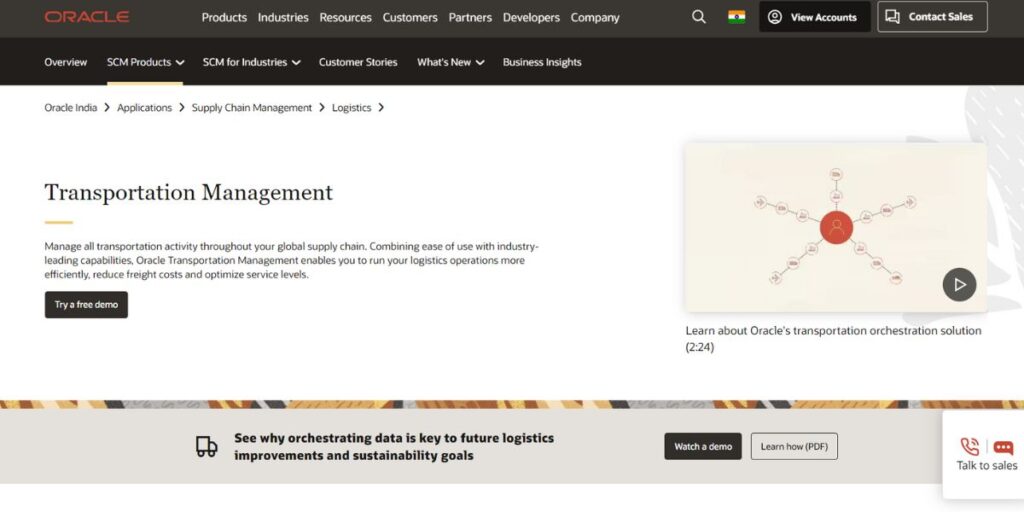
Oracle Transportation Management is an integrated, cloud-based solution for the problems of global transportation. OTM provides full visibility and control in each step of the transportation process: from planning and execution to freight payment and analytics.
OTM supports multimodal transport that will enable companies to manage shipments and consolidate across different modes of transportation: air, sea, and land. It will interface with other Oracle applications and third-party systems for a seamless flow of information and decision-making.
OTM enables the organization to reduce costs while enhancing the service levels and operational efficiency of supply chain logistics.
Key Features:
– End-to-end transportation management
– Optimized route planning
– Freight payment and billing automation
– Global trade management capabilities
– Cloud-based for easy access and scalability
Price:
Like SAP, Oracle uses a custom pricing model. It’s generally considered an enterprise-level solution, so pricing is typically in the higher range. Contact Oracle for a personalized quote.
3. Manhattan Associates Transportation Management System
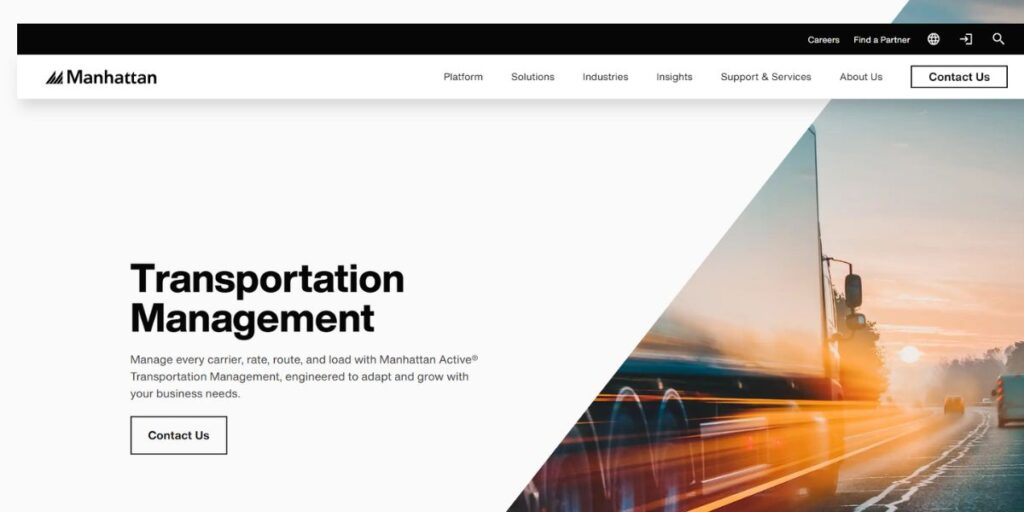
Manhattan Associates TMS is an end-to-end software suite that commands the execution of transportation operations for optimal performance. It eases the planning, execution, and tracking of shipments across various modes of transportation, including but not limited to truck, rail, air, and sea.
Therefore, the system enables better efficiency through process automation, improves carrier selection, and minimizes transportation costs. Real-time shipment visibility allows for better and more timely decisions to be made on disruptions.
Manhattan’s TMS, in particular, enables scalability and flexibility with native integrations to other supply chain solutions, placing it as a core go-to-market solution for companies seeking to elevate their logistics operations and achieve marketplace differentiation.
Key Features:
– Advanced optimization algorithms for route planning
– Real-time tracking and visibility
– Carrier management and selection
– Freight audit and payment
– Supports both inbound and outbound logistics
Price:
Manhattan Associates doesn’t publicly disclose pricing. As a robust enterprise solution, expect the cost to be substantial. You’ll need to contact them for a custom quote based on your business requirements.
4. BluJay Solutions
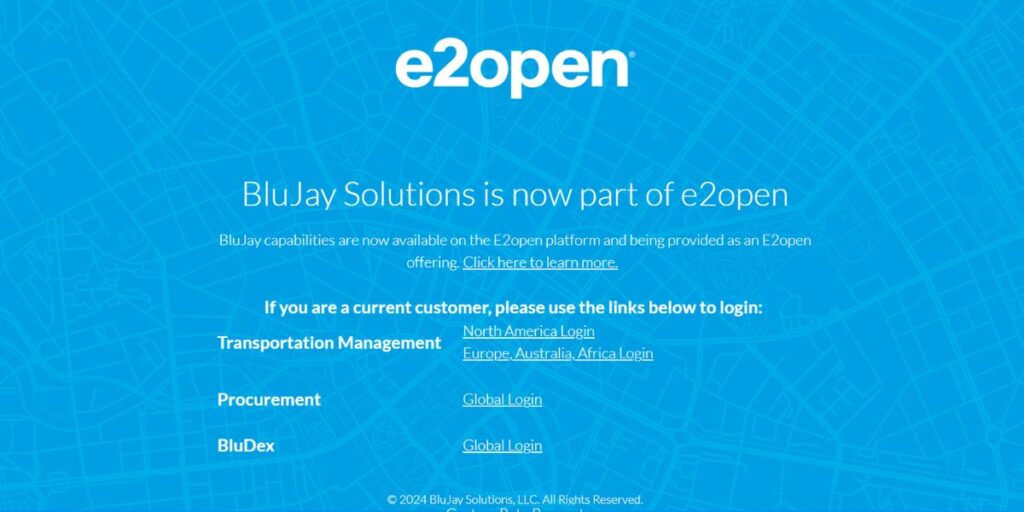
BluJay Solutions provides global leadership in supply chain software and services, having a big suite of logistics and transportation management solutions. Its leading platform creates the ability for companies to maximize their supply chain operations: it improves visibility, efficiency, and compliance.
BluJay Solutions uses cloud-based technology with a large global trade network of real-time data and insights to help businesses make smoother moves in their logistic processes and make smarter decisions.
BluJay’s many integrations with third-party partners and systems mean that it can extend supply chain collaboration, driving cost savings, operational agility, and customer satisfaction for organizations across the globe.
Key Features:
– Global trade network
– Transportation management
– Warehouse management
– Customs management
– Parcel shipping optimization
Price:
BluJay offers customized pricing based on the modules you need and the size of your operation. While not as expensive as some enterprise solutions, it’s still a significant investment. Contact BluJay for a detailed quote.
5. Descartes Systems Group
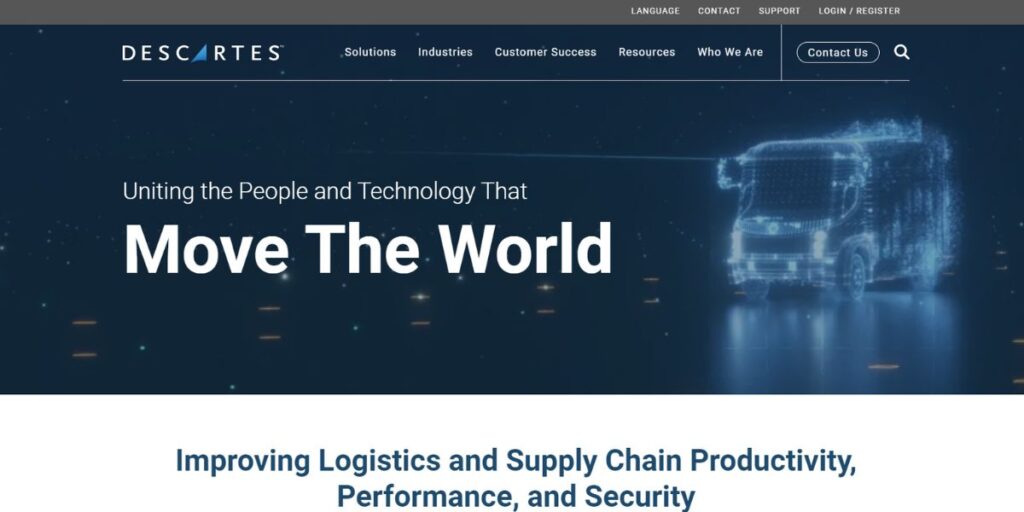
Descartes Systems Group is a leading on-demand, SaaS-based software solutions provider to logistics-intensive businesses. Founded in 1981 and based in Waterloo, Ontario, Canada, Descartes focuses on supply chain management, logistics optimization, and compliance management.
Its advanced platform integrates more than 160 countries through its route planning, transportation management, and customs compliance services, to name a few.
Using sophisticated technologies, such as machine learning and AI, Descartes empowers organizations to execute operational efficiencies, costs saved, and speedier ways to market for their customers in the interest of building trust among its clients.
Key Features:
– Route planning and optimization
– Mobile applications for drivers
– Real-time GPS tracking
– Capacity planning and forecasting
– E-commerce integration
Price:
Descartes offers different pricing tiers based on the size of your fleet and the features you need. Prices can range from a few hundred to several thousand dollars per month. Contact them for a specific quote.
6. Kuebix TMS
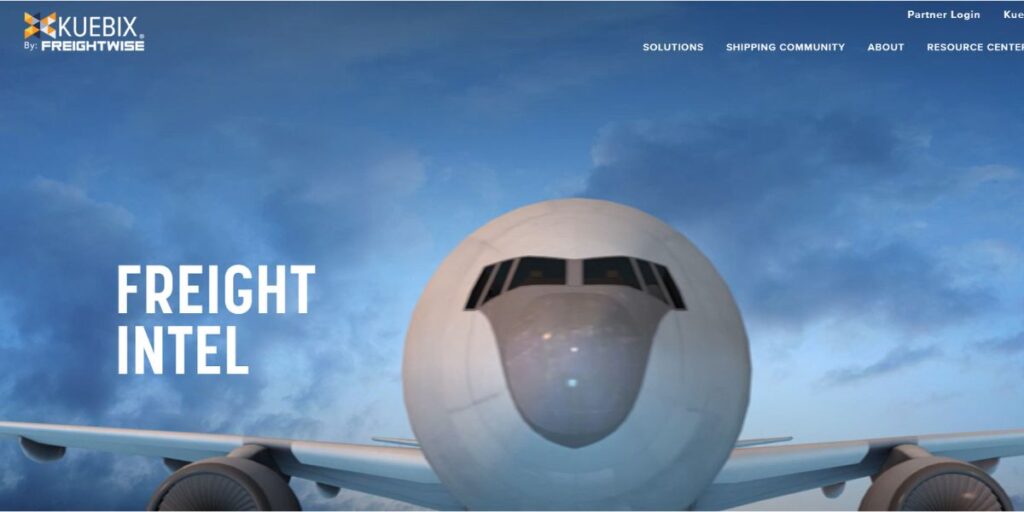
Kuebix TMS is a cloud-based transportation management system. It simplifies and optimizes the transportation operation for shippers, carriers, and logistics providers through tools that will help them manage their freight, book a carrier, track a shipment, and analyze transportation data.
Kuebix offers real-time rate comparisons, automated freight auditing, and supply chain visibility. It is scalable, and thus suitable for businesses of all sizes, from small companies to large enterprises. With the power of Kuebix TMS, shippers can reduce costs, increase efficiency, and boost overall logistics performance.
Key Features:
– Freight intelligence and analytics
– Carrier sourcing and management
– Order and shipment management
– Claims management
– Community load match for finding capacity
Price:
Kuebix offers a free version for small businesses, which is rare in this industry. For more advanced features, they have a premium version with pricing based on your shipping volume. Contact Kuebix for a custom quote.
7. MercuryGate TMS
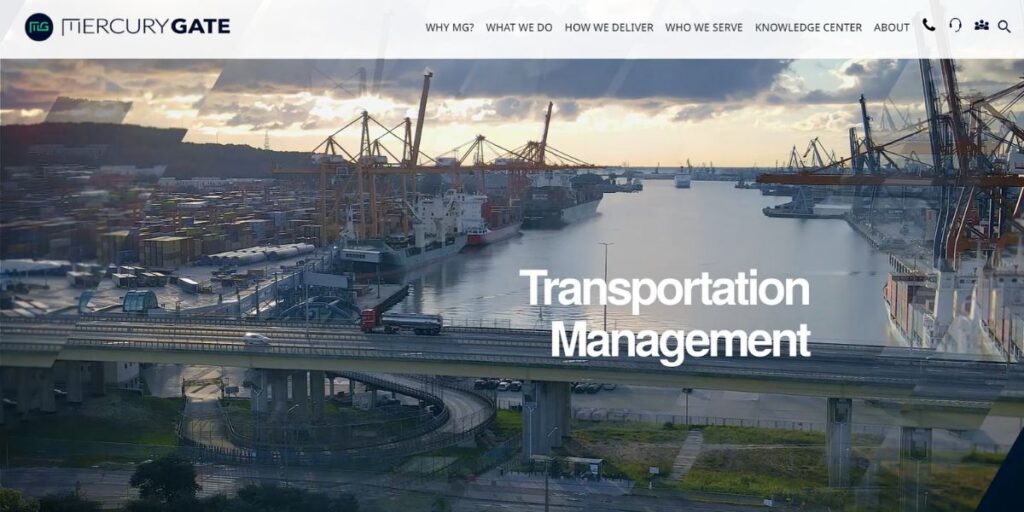
MercuryGate TMS is an all-encompassing transportation and logistics operation optimization software solution. It provides complete visibility, automation, and control over the entire transportation process: from planning and execution to tracking and settlement.
Supported on most transport modes-truck, rail, air, and ocean-the MercuryGate TMS can be set across various industries. Route optimization enhances efficiency and reduces costs while improving service levels.
MercuryGate TMS has a scalable, tailorable platform that will enable the streamlining of supply chain operations and drive profitability and customer satisfaction.
Key Features:
– Multi-modal transportation planning
– Optimization and execution
– Settlement and payment processing
– Business intelligence and analytics
– Cloud-based for easy access
Price:
MercuryGate’s pricing is customized based on your business needs and shipping volume. It’s considered a mid-range to enterprise-level solution. Reach out to MercuryGate for a personalized quote.
8. JDA Transportation Management System
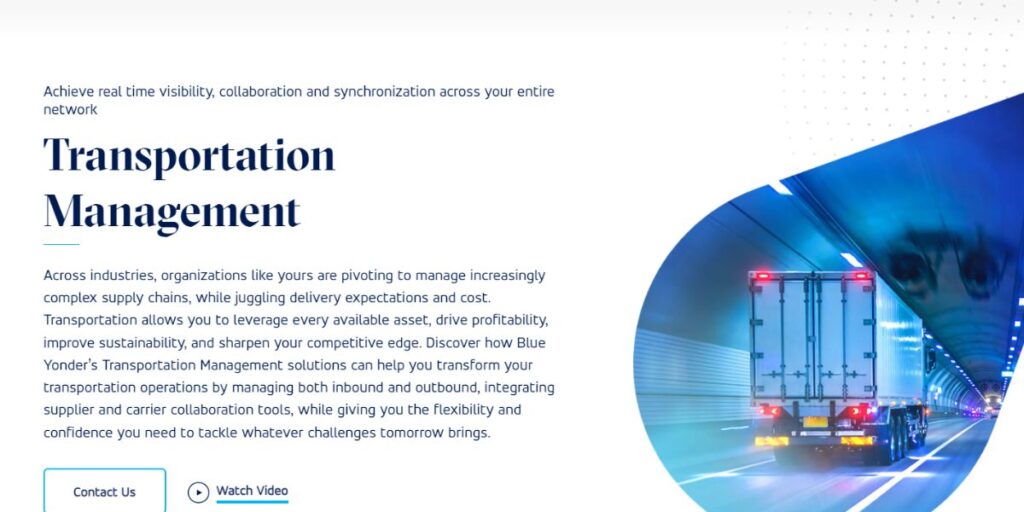
JDA TMS is a designed end-to-end solution to optimize all planning, execution, and monitoring activities of transportation. It saves the company money on logistics while providing improved service levels since several functions, such as carrier selection, route optimization, and freight bill audit and payment, are automated.
JDA TMS can be integrated with various supply chain systems for real-time visibility and analytics, allowing for better decision-making. It does support multi-modal transportation and complex supply chain networks; it is thus ideal for firms whose shipping requirements are very diverse.
With the aid of JDA TMS, an organization would be able to manage time more effectively, utilize human and material resources more gainfully, and delight customers even more.
Key Features:
– Network design and optimization
– Carrier management and procurement
– Shipment planning and execution
– Freight order management
– Analytics and Reporting
Price:
JDA (now part of Blue Yonder) offers custom pricing based on the modules you need and your business size. As an enterprise-level solution, expect pricing to be on the higher end. Contact them for a detailed quote.
9. Trimble Transportation
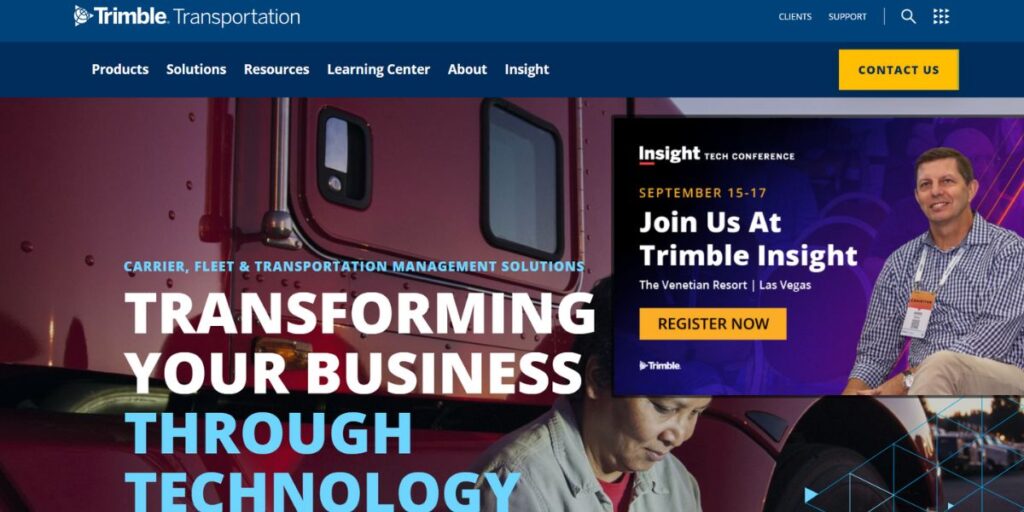
Trimble Transportation is part of the US Company Trimble Inc. and specializes in a wide range of technology solutions within the transportation and logistics industry, ranging from fleet management, routing, navigation, and compliance solutions.
Technology from Trimble optimizes the transport process at the highest level concerning efficiency, cost, and safety for compliance. The customers of the company come from industries that provide services to trucking, shipping, and logistics for companies to smoothen their supply chain.
At Trimble Transportation, innovation is a key issue; hence, the company provides advanced technologies like AI, IoT, and cloud computing to enhance the performance of transportation networks.
Key Features:
– Real-time visibility and tracking
– Route optimization
– Fleet maintenance management
– Driver performance monitoring
– Integration with ERP systems
Price:
Trimble’s pricing varies depending on the specific solutions you need and the size of your fleet. They offer both on-premise and cloud-based options, which can affect pricing. Contact Trimble for a custom quote.
10. FreightPOP

FreightPOP is a cloud-based TMS built to transform business shipping and logistics through the management and optimization of processes. It provides an integrated suite of tools that enables companies to manage shipping, tracking, and reporting across multiple carriers and modes, such as parcel, freight, air, and ocean.
By offering rate comparison, real-time tracking, and automating shipping workflows, FreightPOP has helped companies everywhere reduce costs and streamline operations while gaining a level of visibility into their supply chain that was previously unrealized. Through ease of use and customized options, FreightPOP is the perfect fit for businesses of any size.
Key Features:
– Multi-carrier shipping
– Rate shopping across carriers
– Shipment tracking and notifications
– Integration with popular e-commerce platforms
– Custom reporting and analytics
Price:
FreightPOP offers tiered pricing starting from around $200 per month for small businesses, with custom enterprise pricing for larger operations. They also offer a free trial, allowing you to test the software before committing.
To Sum Up
An ideal solution to choose logistic management software would come in handy in the efficient operation of your business. The ten options discussed in this paper are only some of the best in the market with each of them possessing different advantages. Remember though what was the best depending on your circumstances, the size of your business, and what you could afford.
Besides, do not miss the opportunity to take a free trial or use the demo if any is provided. This will be of great help in as much as it will give you a feel for how it operates before going out on the market to purchase the software. The initial costs may look so humongous, I assure you they are not; just like any investment, good logistic management software will cost you far much less in the long run.
It prevents one from making wrong decisions, helps you in making proper decisions, and the customer is satisfied with the timely delivery. In the modern world where business competence is determined by the speed of processing information, the right tools can be a determining factor between success and failure. Hence, spend as much time as required, and research to select the best logistic management software that suits your business and supports its growth.
FAQs:
1. What is logistic management software?
Logistic management software helps a firm’s business manage supply chain operations: shipment planning, inventory management, route optimization, and warehouse operations.
2. How much does a typical logistic management software cost?
This cost can very well be free or low costs for small businesses, while it may also be for several thousand dollars a month for large-scale enterprise companies. Most vendors provide custom pricing based on your particular needs and the size of your business.
3. Does Logistic Management Software integrate with other business tools?
Yes, many logistic management software solutions can be integrated with other business tools, such as accounting software, e-commerce platforms, and CRM systems.
4. Should logistic management software only be used by big businesses?
No, logistic management software can be found in any size of a business-from small-scale startup business to large multinational ones.
5. What is most important when using logistic management software?
These are just some of the added benefits: improved efficiency, fewer mistakes, a complete view of your supply chain, lower costs, and happier customers receiving on-time, accurate deliveries.
